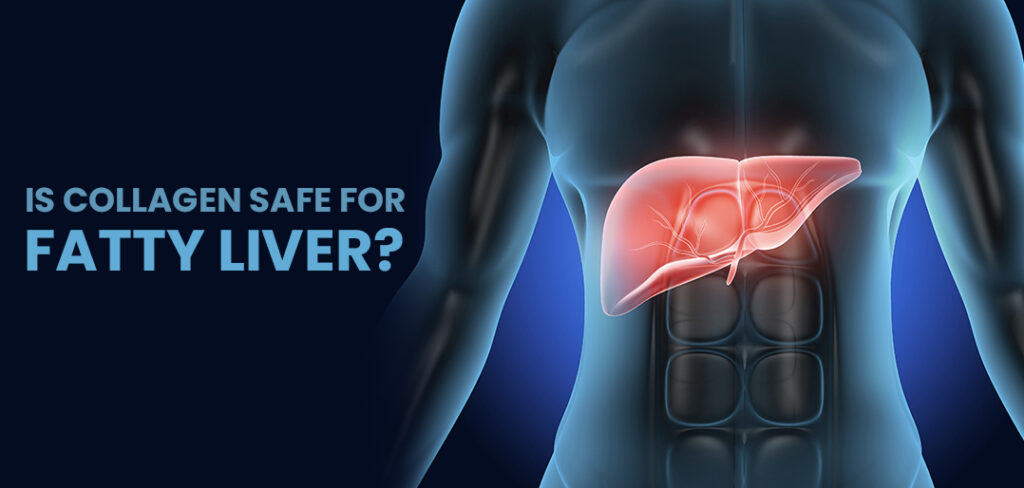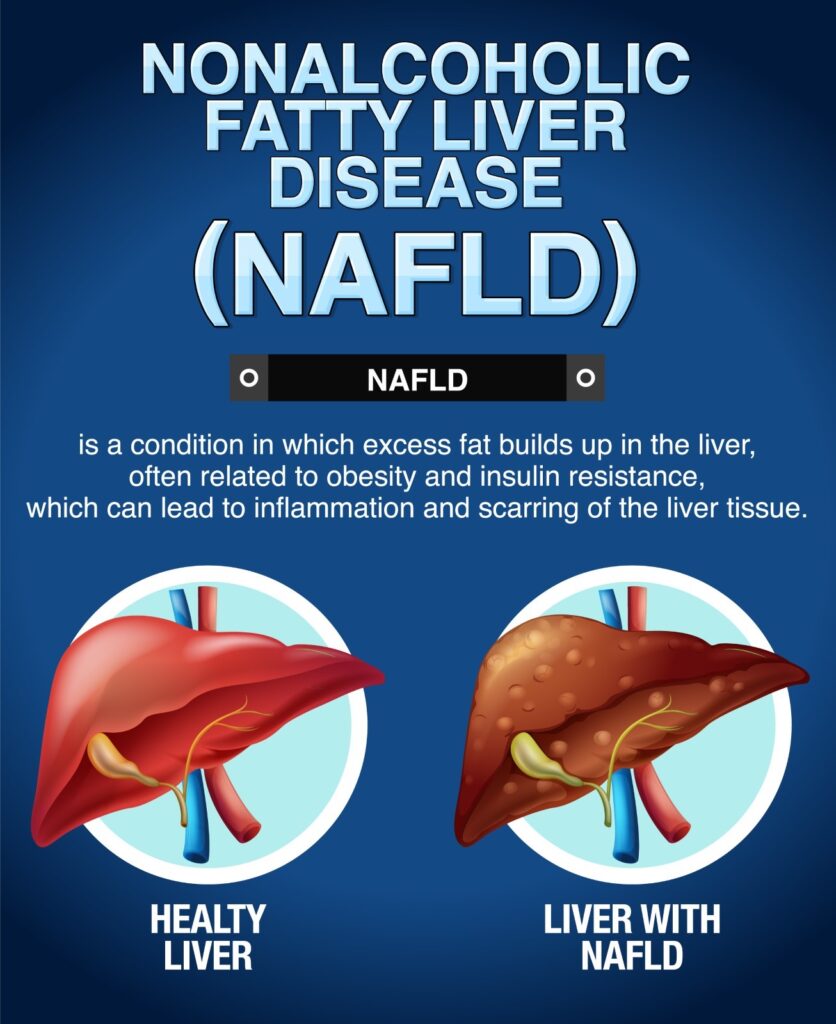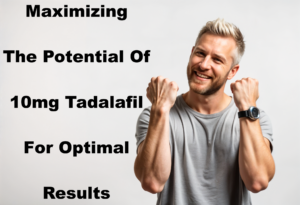
Your liver is only as strong as the amount of collagen in it, which makes it an arduous detoxifier and metabolic powerhouse known as hepatocytes. This is essential to keeping livers in good condition and avoiding cirrhosis or hepatic fibrosis. Collagen is connective tissue that keeps the liver healthy, including hepatocytes, structurally intact, and helps ward off cirrhosis and fibrosis of the liver. In this blog post, we will discuss – is collagen safe for fatty liver?
Can a Fatty Liver Benefit from Collagen?
Fat liver diseases such as non-alcoholic fatty liver disease (NAFLD) and its more severe variant, non-alcoholic steatohepatitis (NASH), are becoming more prevalent in the population. It may cause liver cancer, fibrosis, and cirrhosis, among other dangerous adverse effects.
Recent research has demonstrated that the amino acid glycine, which is present in collagen, protects the liver. Many people wonder, is collagen safe for fatty liver? The answer appears to be yes, as glycine in collagen has shown potential benefits for liver health.

Lower Glycine Levels in NAFLD:
Glycine levels in the blood are frequently decreased in NAFLD patients. Increased risks of obesity, type 2 diabetes, and cardiovascular illnesses are associated with this deficit.
Results of the Clinical Study:
According to a 2020 study conducted by the Michigan Medicine Frankel Cardiovascular Centre, glycine, either by itself or in combination with leucine, can aid in the prevention and treatment of obesity-related fatty liver disease.
Glycine levels are consistently lower in patients with non-alcoholic fatty liver disease (NAFLD) and associated comorbidities. According to the study, glycine at a daily dose of 27 mg/kg, or around 2 g per day, may have therapeutic benefits. One 10g dosage of CollagenX hydrolyzed collagen has this quantity.
Can Collagen Help With Cirrhosis of the Liver?
A severe illness known as liver cirrhosis causes the liver to become scarred and lose its ability to function. Even though severe cirrhosis is difficult to cure, the condition is manageable.
The Function of Glycine:
Hydrolyzed collagen contains a lot of glycine, which has anti-inflammatory and antioxidant qualities that can help maintain liver function.
Research Findings:
The same 2020 study also discovered that leucine, which is also present in hydrolyzed collagen, and glycine worked better together to reverse inflammation and liver damage than glycine alone.
By incorporating hydrolyzed collagen into your diet, you may support liver function and maybe decrease the onset of cirrhosis by maintaining appropriate levels of leucine and glycine.

How to Prevent Non-Alcoholic Fatty Liver Disease?
A comprehensive strategy can prevent NAFLD. This requires eating a balanced diet, exercising often, and keeping a healthy weight. This is how collagen functions in this context:
Healthy Weight:
Maintaining a healthy weight can reduce the risk of NAFLD. Exercise and a balanced diet can help. Hydrolyzed collagen contains leucine and glycine, which promote metabolic health and may help with weight management.
A Well-Rounded Diet:
Include foods high in glycine, such as spinach, meats, dairy, beans, and shellfish. Although, For optimum health, these sources may not offer enough glycine, though.
Daily Exercise:
Exercise enhances liver function and aids in maintaining a healthy weight. These advantages can be increased by combining collagen supplements with exercise.
Supplementing With Collagen:
Ensuring sufficient intake of glycine and leucine promotes liver function and general metabolism.
Dietary Collagen: The Secret Power of the Liver
Dietary collagen may lessen the incidence of cirrhosis and fibrogenesis by preventing fat from accumulating in hepatocytes, the cells that make up the liver.
Medicine facilitates liver cleansing by lowering inflammation and boosting healthy tissue. Macrophages’ interaction with cells is a part of this process.
Collagen’s Function in NAFLD and ALD
A distinct contrast is visible when we look at patient cells under a microscope that have both liver cirrhosis and inflammation. Collagen synthesis is affected in cases of both ALD and NAFLD. These disorders are frequently associated with chronic liver disease, which may result in liver fibrosis or even liver cirrhosis. This progression of fibrosis is concerning. It seems like your liver is trying to fight fibrosis and inflammation by making more collagen. But it ends up overproducing, which causes fibrotic cells.

Overproduction of collagen causes inflammation and fibrotic alterations in cells, which results in the condition known as fibrosis, or scarring of the liver tissue. Think of your cells creating fibrosis and inflammation, akin to a skin scar following an accident.
Collagen Role in Maintaining Liver Health
Here are some more details about – is collagen safe for fatty liver. T1rho imaging reveals that collagen, which is essential to the structure of cells, is involved in preserving liver function and preventing fibrosis. T1rho promotes overall healthy liver function, helps prevent fibrosis (scarring), and repairs damaged hepatocytes (liver cells).
Incorporate Collagen Into Diet
Foods like bone broth, fish and chicken skin, and some meat cuts naturally contain collagen This is vital for cells and the control of liver fibrosis. These resources could help keep liver levels stable. As an alternative, you can nourish cells and perhaps help manage liver fibrosis and liver T1rho by using supplements like collagen powders or capsules.
Is Collagen Safe For Liver: Side Effects Of Consuming Excessive Collagen
Collagen is considered safe and has few side effects when liver fibrosis and liver T1rho are present. However, a small number of individuals may experience mild gastrointestinal issues or allergic reactions linked to liver fibrosis, liver collagen, and liver T1rho. As always, you should see a physician before starting a new supplement regimen, especially if you have T1rho or liver fibrosis.
Final Words
The epidemic known as non-alcoholic fatty liver disease (NAFLD) presently has no approved medicinal treatments. Hydrolyzed collagen contains glycine, which is a potentially useful natural method for supporting liver function. Maintaining a healthy weight, getting regular exercise, eating a balanced diet, and taking collagen supplements can all help to preserve your liver. To find the solution to the question – is collagen safe for fatty liver, book a consultation with Direct Preventive Care for a personalized treatment plan to take control of your liver’s health. Take a step and make lifestyle changes that support a healthy liver.














